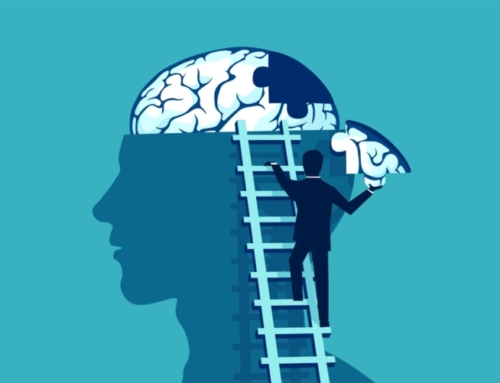This week we completed our 5-Day Psychiatry Board Prep Course in Chicagoland. (It was great to see and speak with so many colleagues there.) At the course I received several questions from our attendees about what turns out to be a single problem described in different ways. The problem is a manifestation of one type of perfectionism. It arises as a feeling of a strong need to get complete and/or definitive information about a case described in an exam case vignette question. Because complete and definitive information is not forthcoming, the candidate with this type of perfectionism feels frozen in indecision and rising frustration and is unable to either answer the question or let it go and move on. This state of frozen indecision burns up a lot of time and drains the candidate physically and mentally. Every question seems of existential import and the exam is a huge minefield with the end somewhere far out of sight. Talk about wanting to just run away!
This is a type of perfectionism that disallows acceptance of what IS from an overpowering desire for what SHOULD BE. There is an overpowering need to get enough information so that a response option can be chosen with high certainty.
Sorry. Candidates can huff and they can puff, but they won’t squeeze out any more certainty. The vignettes are what they are; they include the information that they include and not one itsy bitsy more than that. In other words, especially on the case vignette type of questions, candidates have to decide (on a response) under conditions of uncertainty. Hey, in this way these questions are like the real world of doctoring. Wow! Intentional, you think?
From one colleague I spoke to I had the sense that he treated the vignettes as if it were real people. But they are not. Real patients have more to them than what they have already said or shown of themselves. As clinicians we can always spend more time with them asking questions, taking history, examining them, or ordering more labs. With real patients, in most cases, we know when we’re not sure and when the situation is not emergent, we know we can learn more about them to achieve greater diagnostic clarity and treatment certainty.
Again though, vignettes are not people. There is nothing else hiding behind the words. We can’t look beyond them and find additional signs and symptoms, nor can we spend more time getting to the bottom of things. No. The vignette is only and nothing more than the words on the screen that you see right there in front of you.
As an exam candidate you MUST make the best choice given the unabashedly and unapologetically incomplete information that is written into the vignette. Not only is the information provided ALWAYS incomplete – how could it be otherwise – but also sometimes there is information that does not fit; that is, the totality of the information seems to direct you to a specific, most reasonable working diagnosis from the options provided, but there is a tiny piece that either seems irrelevant or goes against what you find yourself regarding at that time as the best option to choose. Yes, inconsistent information is possible and for the perfectionist this raises their frustration, ire, and indecision to new heights.
BTW, if you’re a perfectionist, I’m not making light of this dilemma for you. We are all perfectionistic in our own ways and to various degrees. We ALL feel frustration, even anger and anxiety in the face of uncertainty when a decision is called for. (Hey, I want a clinician who sweats the details.)
Hardly anyone feels good about their board exam performance. Nearly everyone feels stymied by exam questions, especially the ones that are not fact-based and instead are judgment-based. When you face a fact-based question, you perceive and accept that you may not know the right answer and that, perhaps, you should have studied more. But at least you feel confident that there is a right answer, one that is surrounded by three or four wrong answers in the response options listed. With these fact-based types of questions you may feel frustration of your lack of knowledge, but you will usually not feel torn up, screaming inside your mind for just a little bit more time and a little bit more information beyond the words presented on the screen.
So, what can you do? The way I’ve described this problem already suggests the solution: you need to come to understand the nature of the problem of the incompleteness/inconsistency of exam questions and, even more importantly, with your response to these types of triggering exam questions. Next, you need to accept this state of affairs and comport yourself during the exam, remaining mindful of the incompleteness/inconsistency of questions and the fact that there is nothing you can do about it: they are written in this way on purpose (to better reflect real-world decision-making). You can also remind yourself that every single other exam taker is facing this same kind of question and is, probably, dealing with their own frustration and indecision. Next, you need to ignore the little screams of perfectionistic need in your mind. And, last, you just have to choose the answer YOU believe is the best choice. Best here means best under the conditions of knowing the little that you know from the little that is presented to you.
Now, why did I capitalize YOU in the previous sentence? I want to highlight that you need to trust your own knowledge and experience and clinical acumen (built up over years or decades) instead of getting lost in a netherworld of trying to guess what the vignette writer’s intentions were. We know what the exam writer’s intentions were: to test your ability to make reasonable choices under conditions of uncertainty. Voila!
Now, go forth, answer the darn question in front of you, and move on to the next one; repeat until finished.
After the exam have a good cry, have a drink, ask for a hug, drop and do 100 pushups, and/or take a very long walk in the woods or along the shore.
Thanks and let me know what you think and which topic you would want me to cover.
Dr. Jack
Language Brief
“If it scares you, it might be a good thing to try.” — Seth Godin
“I wanted a perfect ending. Now I’ve learned, the hard way, that some poems don’t rhyme, and some stories don’t have a clear beginning, middle, and end. Life is about not knowing, having to change, taking the moment and making the best of it, without knowing what’s going to happen next. Delicious Ambiguity.”― Gilda Radner
“Have patience with everything that remains unsolved in your heart. …live in the question.” ― Rainer Maria Rilke
“I took a test in Existentialism. I left all the answers blank and got 100.” ― Woody Allen
“As far as the laws of mathematics refer to reality, they are not certain; and as far as they are certain, they do not refer to reality.” ― Albert Einstein







Leave A Comment